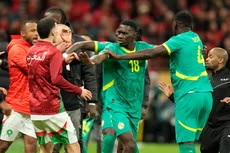Senegal assistant coach Teddy Pellerin: “We cannot risk these Key fixtures by rotating players”

Senegal assistant coach Teddy Pellerin has underlined the national team’s intention to approach their upcoming friendlies against Ireland and England with full commitment, emphasising the need for intensity and focus during this crucial June training camp.
As the Lions of Teranga prepare to face two highly competitive European sides, Pellerin made it clear that these matches are not being treated as opportunities for broad squad rotation or casual experimentation.
Despite the fact that the camp falls at the end of a taxing club season for many players, he stressed its importance in shaping the squad’s performance going forward.
“This June training camp is always a key period for us,” Pellerin said. “It may come at the end of the club season when players are tired, but for us, it’s an important moment to assess their condition and lay the groundwork for our September plans.”
With nearly the full squad reporting for duty in the opening training session, Pellerin noted that the focus was immediately directed towards tactical preparation and raising the overall level of performance.
The session served as both a reunion and a first step in adapting to the style and intensity of their upcoming opponents.
“From the very first session, we wanted to bring up the tempo,” Pellerin explained. “We’re playing against two British teams known for their intensity and physicality, so it’s crucial we are able to match that. We can’t afford to ease into it.”
The assistant coach also pointed to the varied physical conditions of the players—some arriving well-rested after a break, others having just concluded demanding domestic seasons.
He acknowledged that the coaching staff must be cautious not to overburden certain individuals while also ensuring strong preparation for the matches ahead.
“There are players who’ve had longer breaks and have recovered well, while others have come in with more match rhythm,” he said. “It’s up to us to strike the right balance.
But let me be clear: these are two very important matches. We can’t jeopardise the outcomes by prioritising playing time distribution. That’s not the approach we can afford to take.”
Pellerin stressed that the matches against Ireland and England serve as much more than friendlies—they are critical tests that mirror the intensity and tactical challenges found in top-level African football.
According to him, the team’s ability to compete physically and mentally will be key in future competitions, including the Africa Cup of Nations and World Cup qualifiers.
“These two teams will push us physically and tactically,” Pellerin noted. “To be successful in African football today, you need to match intensity in duels and in the flow of the game.
That’s why this opposition is so valuable—it mirrors the challenges we face in our own competitions.”
With a clear focus on results and high-level preparation, Teddy Pellerin’s message is unambiguous: Senegal’s friendlies this June are not just about player rotation or post-season wind-downs—they are about building a battle-ready squad capable of competing at the very top.




